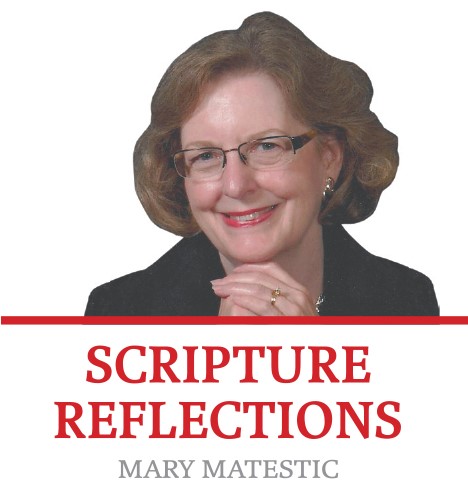Scripture Readings, July 18, 2021
July 18, 2021
Sixteenth Sunday in Ordinary Time
Jeremiah 23:1-6
Ephesians 2:13-18
Mark 6:30-34
Every summer (except for last year), my husband and I attend a scripture conference at University of St. Mary on the Lake in Mundelein, Illinois, a large established school of theology and seminary. The topics vary from year to year, but over time, we have found one of the joys is meeting with familiar faces from across the country. People involved in ministry in their parishes come to rest a while, enjoy the beautiful campus, and engage in morning and evening prayer, as well as daily Mass. They come excited to learn, but also needing rest and a departure from daily mission. I enjoy hearing their stories: where they teach, the complications of mission, the losses they felt with COVID-19, but more so their interminable drive to carry on and bring the Word of God to the people.
Ministry is difficult. Rewarding, but difficult. It is rewarding because behind it is the call of God where grace is anticipated and embraced. It is difficult because the lives of God’s people are complex and ask of the minister skills that help make the crooked paths straight.
Managing ways to invite the doubter, those left behind, those who are angry, those who have given up, those who experienced illness or loss, becomes the challenge of the 21st Century Catholic leader. It is not far removed from Jesus, who sent his apostles out two by two possessing only the authority to teach and to heal. When the apostles returned to tell Jesus about how his authority was used, they were tired, and Jesus, the good Shepherd, recognized it. He invited them to come away for a while to rest in a deserted place, a place where the people wouldn’t find them.
Like the game rock-paper-scissors, the people outguessed the Apostles and beat them to the desert on foot. What the apostles tried to escape, they could not. Jesus does not roll his eyes, he does not try to hide, he does not try some covert plan to escape the people, but he looks upon them with compassion for he realizes, “They were like sheep without a shepherd.” The camera is upon Jesus while the weary Apostles watch.
What made the crowds come anyway?
Compassionate love. Compassion requires an interpersonal exchange in which one person feels and suffers with another. John Shea says that it is not about keeping our distance, but about overcoming our differences. We live in a world with others sharing their joys and sorrows, their hopes and dreams. We are connected to people at the grocery store, in waiting rooms and at backyard picnics where life is celebrated with a beer and a brat. COVID-19 made us appreciate these connections all the more.
This moment with Jesus and his apostles becomes a model for ministers and really everyone. Jesus is not better than the people he serves. He is one with them.
Dorothy Day cautioned her community of Catholic Workers not to make the distinction “between the deserving poor and the undeserving poor.” The minister is not greater than, but one with the poor. Any other attitude sabotages the mission. Day warned her people not to judge those they served as to how they contributed to their poverty and therefore to divide up their compassion, honoring the worthy poor alone. (Camille, 71) The prophet Jeremiah casts the neglectful leaders of his day into “woe” territory. For these leaders scattered the sheep; they did not care for them.
The crowds before Jesus are those scattered sheep. The promise of Jeremiah is that the Lord himself will gather the remnants of Jerusalem and bring them back to healthy grazing fields. He will appoint shepherds who are compassionate and good leaders so that the people will not have to live in fear.
In our dog-eat-dog world, sometimes crass and uncaring, individualistic and haughty, what does compassion look like? The fact is it has nothing to do with how we feel; rather, it has everything to do with that divinely inspired movement that comes from the depths of our hearts. What it aims to do is to know the will of God and to follow it as a response to the call of God. One writer said that when Jesus feels compassion, he responds with teaching, healing and food. “He does not stop to consider the worthiness of the blind person, the crippled man or the woman who suffers with a hemorrhage. He does not mull over the virtue of the crowd before he feeds them.” (Shea, 185) Yes, there will be people in our ministry who are wonderful and people who are repugnant. We are asked to serve all.
The apostles may have been tired and hungry, their plans might have changed, but Jesus their teacher took them to a whole new level of ministry, one shaped by selfless love. Jesus could not abandon his people.
Nor can we.
Resources: Alice Camille, The Rosary, Mysteries of Joy, Light, Sorrow and Glory, Acta Press, 2003, 71-72.
John Shea, Mark: Eating with the Bridegroom, Liturgical Press, 2005, 185.

